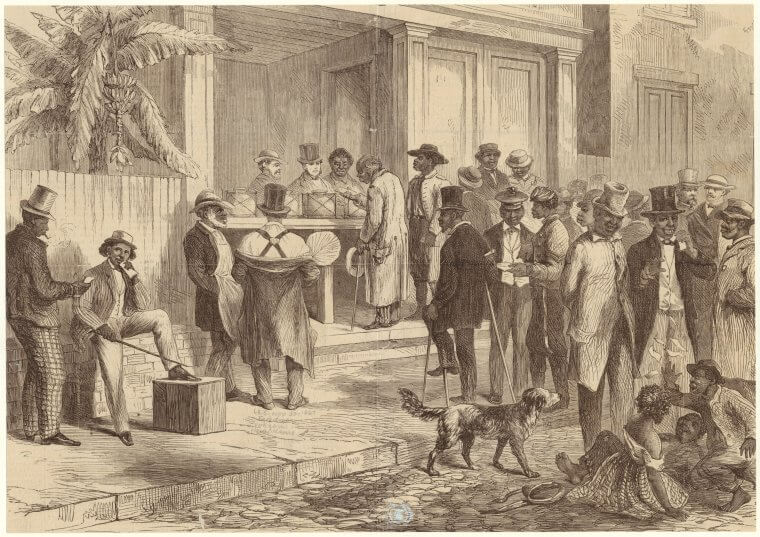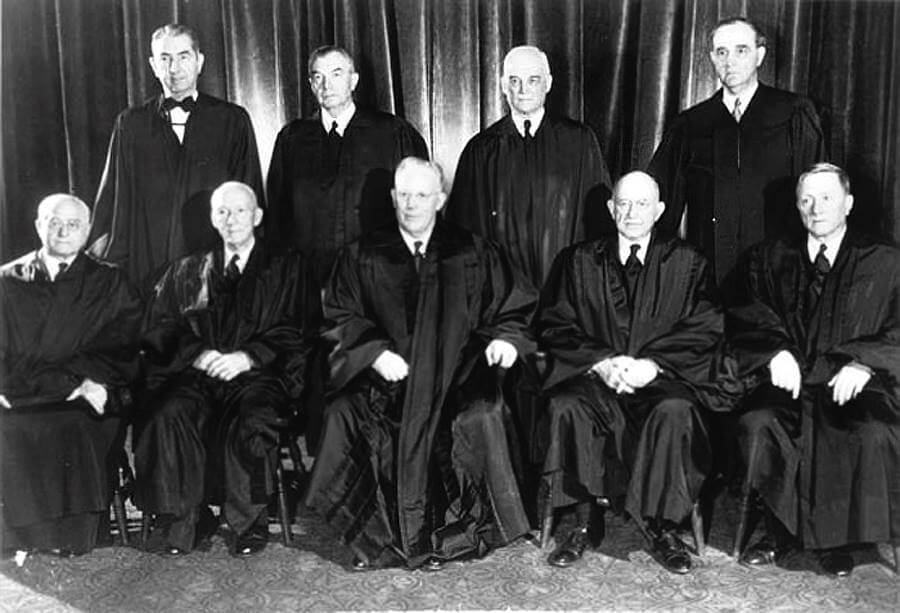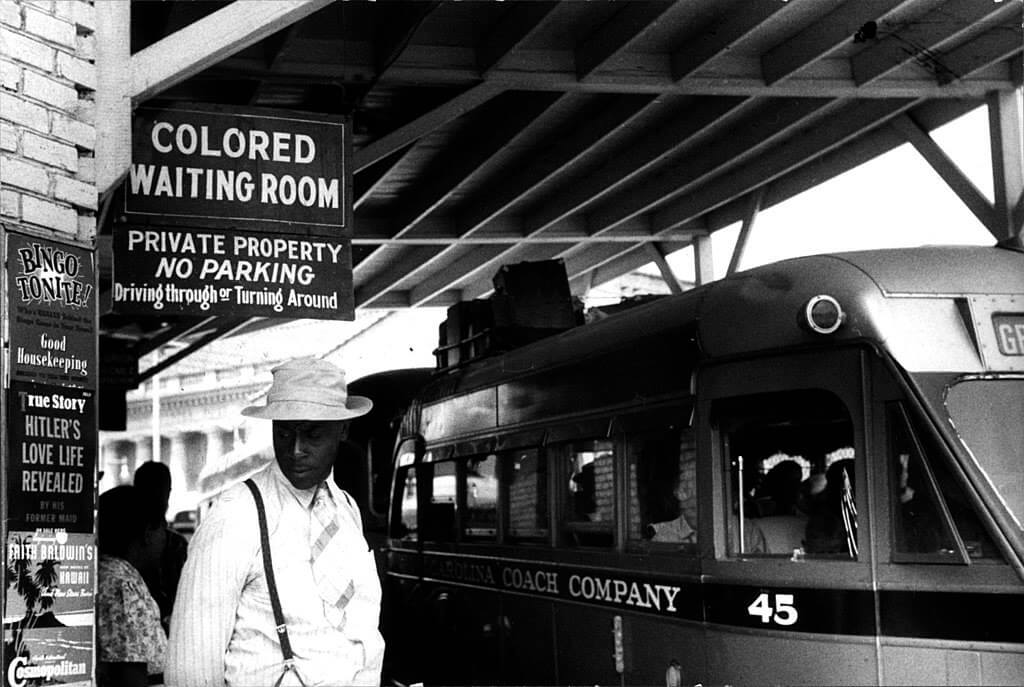
Jim Crow era began with the Compromise of 1877 when Republicans and Democrats agreed to settle a disputed presidential election. The Republicans appeared to have lost with one Electoral Vote short of victory with two states’ votes in dispute and already had won the Popular Vote. The Democrats allowed the Republicans to claim victory on one condition: Removal of Federal Troops from the South. It was a big mistake.
With the removal of Federal Troops from the South, the African-Americans lost the protection of the Federal Troops that were brought to the South at the end of the Civil War to maintain order and to protect the former slaves. In 1878, Republican President Rutherford Hayes signed into law the Posse Comitatus Act, which ensured Federal Troops could never again be used in that manner on U.S. soil, protecting African-Americans. And without Federal Troop protection, the Democrats began a reign of terror, which included voter suppression, racist Jim Crow laws, and lynching as a way of intimidating blacks.
During the Reconstruction Period, which began in 1865 after the end of the Civil War, the 13th Amendment to the U.S. Constitution was passed abolishing slavery.
Not satisfied with the language of the13th Amendment, Congress passed the Civil Rights Act of 1866, which used the authority to enforce the newly ratified 13th Amendment. However, President Andrew Johnson vetoed it but Congress successfully overrode his veto and it became law.
The 14th Amendment followed in 1868, which extends citizenship and legal rights to all people, including former slaves. It is considered one of the most consequential amendments because it addressed citizenship rights and equal protection under the law.
The third and last of the Reconstruction Amendments was the 15th Amendment, which prohibits the federal government and each state from denying a citizen the right to vote based on that citizen’s “race, color, or previous condition of servitude.”
Segregation laws

By the end of the Reconstruction period, white legislators on state and local levels passed a series of laws that segregated African Americans and Whites in public facilities such as schools, parks, cemeteries, theaters, and restaurants.
In addition to barring African Americans and Whites from being integrated in public areas, laws were established prohibiting African-American men from participating in the election process. By enacting poll taxes and literacy tests, state and local governments were able to exclude African Americans from voting. And as the Southern economy declined, Democrats took power in Southern legislatures and used intimidation tactics to suppress black voters.
The origin of the phrase Crow has often been attributed to “Jump Jim Crow,” a song-and-dance caricature of blacks performed by white actor Thomas D. Rice in blackface, which first surfaced in 1832 and was used to satirize Andrew Jackson’s populist policies.
After the Reconstruction Period and the departure of Federal Troops from the South, the Southern states were emboldened to pass segregation laws to separate the blacks from the whites. The term “Jim Crow” was used to define the time period.
Thus began a way of life during the Jim Crow era that saw the Ku Klux Klan and White vigilante groups intimidating Blacks to keep them from rebelling against these racist laws. Lynching and burning churches and newspaper offices were used to instill fear among African-Americans.
Black migration

African-Americans in the South began migrating to cities in the North and West hoping to escape the de jure segregation of the South. However, de facto segregation still existed in the North.
In 1905, more than 100 African American men throughout the U.S. founded the Niagara Movement. Four years later, the movement expanded to become the National Association for the Advancement of Colored People (NAACP) to fight against racial and social inequality through legislation, court cases, and protests.
In 1954, Brown v. Board of Education ruling found the “separate but equal laws” unconstitutional and it desegregated public schools. In 1955, Rosa Parks refused to give up her seat on a public bus. It led to the Montgomery Bus Boycott, which lasted over a year. Thus began the modern Civil Rights Movement. Men like Martin Luther King Jr. emerged to lead the movement. And finally, Congress passed the Civil Rights Act of 1964 and Voting Rights Act of 1965. With these legislations, the Jim Crow era ended.
Switching party names
It’s interesting to note that the Republicans during the time of Lincoln were the Democrats today. In 1964, the Republicans implemented their “Southern Strategy” to win presidential elections by appealing to conservative whites — especially white southern Democrats – that switched to the Republican Party while the Northern liberal Republicans switched to the Democratic Party.
Fifty-five years later, ex-president Donald Trump who was defeated in his re-election bid in 2020, refused to concede the election to President-elect Joe Biden. On January 6, 2021, Trump incited his supporters who gathered in front of the Capitol building to attack the Capitol. Thousands of screaming men and women forced their way inside the Capitol. They entered the Senate floor where then vice president Mike Pence was presiding over a joint session of Congress to count the results of the Electoral Votes.
Once inside the Capitol, the mob chanted, “Hang Mike Pence! Hang Mike Pence!” Pence was able to evade the murderous insurrectionists and hid in a secure room. Outside the Capitol, a hangman’s noose was erected waiting for Pence to be escorted out of the building to meet his death by hanging. The mob also went from room to room looking for the lawmakers, ready to assassinate them. By just a few seconds, the revolution that would have overthrown the government of the United States failed to materialize when the rebels didn’t locate Pence. On January 20, Biden was sworn in as President of the U.S.
But Trump refused to concede. He vowed to challenge the election result by encouraging the Republican Party of Arizona to conduct a hand recount of 2.1 million ballots cast in Maricopa County.
What is strange is that examiners were looking for bamboo in the ballot paper, believing in the conspiracy theory involving ballot paper shipped from China. The signatures on the mail-in ballot envelopes were also being reviewed to ensure the voters signed them all.
Voter suppression
Trump has been watching the election “audit” with great interest. He told people that he believes the Arizona audit “could undo” the results of the 2020 elections. He promised that he would be reinstated as president by August. But granted that he won the Arizona election, that is only 11 electoral votes, which is not enough to change the result of the election. Then what’s next? Pennsylvania, Michigan, and Wisconsin? And who would certify the results of the audits? More than likely, it would be submitted to the Supreme Court, which many believe would throw out the results.
Meanwhile, more than 250 bills have been introduced in 45 state legislatures to roll back voter access, 24 of them in Arizona alone.
What is going on? Is it a resurgence of the Jim Crow era?




Leave a Reply